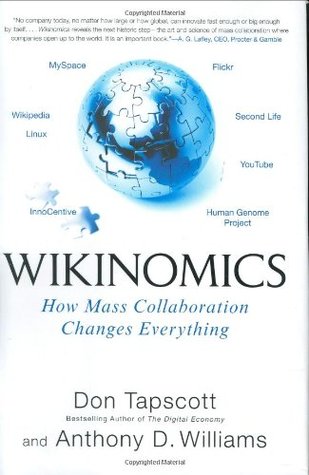Wikinomics Summary – Don Tapscott and Anthony Williams
<1 min read ⌚
MicroSummary: In Wikinomics, Don Tapscott & Anthony Williams write about the powers of mass collaboration and how it is changing the way companies innovate. In Wikipedia times and dozens of other products and services co-created by thousands of people, the authors created the term Wikinomics to describe the unique blend created by technology and globalization that allows massive collaboration to be possible. Mass collaboration leads to innovation and catalyzes changes in society itself. If you own a company, you need to be aware of the effects of Wikinomics to innovate and defend yourself competitively as consumers want to be more and more involved in creating those products.
How Mass Collaboration Changes Everything
We live in a world which transforms rapidly. The digital age creates many new circumstances for all of us. It poses new opportunities, new constraints.
So what has changed? And how do those changes affect you and the age of Wikinomics? Our “Wikinomics Summary” explores these questions and more.
Now, let’s dive right into it.
Who Should Read “Wikinomics”? and Why?
It is relatively challenging to specify a group of readers to whom this book would be intended. Magnificent piece of work written for HR Managers, Scientists, Futurologists, and Experts who wish to expand their views and get a broader perspective of where this digital age is going.
Students known for their thirst for new knowledge would find Don Tapscott and Anthony D. Williams’s work as one of the most extraordinary and exceptional business guides they have ever read.
Known for its first-person examples and high-quality tips “Wikinomics” is no wonder an all-around book that can answer any business related question.
Next, before we thoroughly examine the book’s content, we’ll cover the authors’ bio and their expertise.
About Don Tapscott and Anthony Williams

Don Tapscott was born on July 1, 1947, in Toronto, Canada. He is an author, consultant, business innovator and executive that is focusing on combining different business strategies that would generate an organizational transformation in the society.
As a founder of New Paradigm, that is currently owned by NGenera, and as a CEO of the Tapscott Grouping, Don Tapscott encourages companies to overcome organizational boundaries by associating with the latest technologies.

Anthony D. Williams is a Canadian Born author, a senior fellow at the Lisbon Council, founder of the Anthony Williams Consulting in Toronto and a strategic adviser to different governments, global institutions, and other Fortune companies.
He was born in 1974 in Toronto, Canada. Anthony Williams and Don Tapscott as co-authors of Wikinomics are repeatedly dismissing any criticisms based on their book without answering any of the critics.
Okay, now that we covered the basics, let’s continue with the detailed summary.
“Wikinomics Summary”
Don Tapscott and Anthony D. Williams through their Wikinomics book try to intrigue readers in numerous ways.
The book examines all possibilities of massive data sharing and participating in open-source software that is available to all business participants, consultants, and experts.
Back in the old days, sharing and delivering an information required a lot of effort, now all you need is a computer with unlimited access to all sorts of free encyclopedia sites.
So to speak every user is familiar with the fact that the digital era contributes to a new highly educated population.
Now, what can you expect while reading the book?
Well, some of the examples that you may run into while reading Wikinomics would probably sound familiar, while others may seem a little surprising and maybe even shocking.
These authors are so intently a part of the new era that makes them feel obsessed with knowledge -seekers – for instance, sometimes specific actions or changes that are done by few enthusiasts seem like some internet transformation procedure.

You Probably Have Already Developed A Product
Collaboration has won, and daily we are connecting to create new products and services. If you’ve ever edited a Wikipedia entry or helped Buzzfeed generate a list, supported products on Kickstarter, you’ve already participated in mass collaboration.
Easy access to information technologies is the primary tool for active participation of digital communities, where collaboration happens in a natural and scalable way. Look at Wikipedia for example. Do you remember Microsoft’s Encarta?
In the past, only encyclopedists were responsible for gathering the knowledge of the world into quality books and creating the final version of an encyclopedia, which was then printed annually (or recorded on a CD ROM).
Today, any individual can participate in creating encyclopedic content on their areas of knowledge through Wikipedia.
Just write an article, which will be discussed and edited by the wiki community and voilà, we have a new topic in the largest encyclopedia on the planet.
Why Collaborate If You Can Go Alone
Well, the truth is that most companies are terrible when it comes to innovation.
Going alone can almost always become synonymous with failure. Currently, according to Tapscott, 90% of new end consumer products fail.
The traditional model of innovation no longer works, and the wiki model is the perfect storm.
The wikinomics model emerged from a unique blend composed of low-cost collaboration technology (also called the internet), a large mass of digital natives enabled to use these tools and various evidence, real cases that collaborative innovation works.
The world is experiencing its new revolution. The digital sphere is taking over all operations, as a more accessible and quicker way to build networks and streamline the processes. Mass collaboration is the light at the end of the tunnel.
Not to mention innovation that as a term and concept is continuously shaping and remodeling based on the opportunities presented. For instance, if a company wishes to instill new principles/practices/methods/technologies within its ranks, it no longer needs to rely on paperwork heavily.
A countless of tools available today are manifesting the bright future that awaits us, which facilitates the problem-solving as a process. To put it differently, no longer people need to abide by outdated norms and non-actionable techniques. Moreover, the tech-savvy society promotes thousands of channels that can replace these conventional triggers, which are slowing the progression and endangering the prosperity.
As the Internet Culture continues to evolve, mass collaboration becomes even more fundamental. After all, unlike traditional media such as TV, Radio and Printed Media, the internet is a channel of endless ways.
It’s like a phone, but where any number of people can be on the line at the same time and this new nature of the medium has made it the perfect tool for collaboration.
Collaboration involves the self-organized participation of many people, such as in a colony of bees.
The interaction between these individual actors seems complicated, so in the next passage, we will make some sense of this apparent chaos.
Goldcorp, A Case Study Of Massive Collaboration
Goldcorp is a Canadian mining company. Increasingly the company suffered from fewer resources in its mines and an uncertain idea of where to look for new gold mines to explore.
The company’s team of geologists failed to advance with their traditional exploration and definition of new areas to explore that had worked previously but no longer yielded results.
The CEO made a landmark decision to open the exploration problem by making the geological data available to the market. Previously, these data sets were kept under lock and key.
An army of scientists and enthusiasts, computer scientists and mathematicians took an interest in the problem and came up with a huge list of places with high potential for exploration.
More than half of them were unknown to the company’s geologists team. The company went from $ 100 million to $ 9 billion in just four years.
The Basic Values Of Wikieconomy
For the authors, there are fundamental values to be adopted by companies so that they can enjoy the benefits of the wikinomics model. They are:
- Open: Are you ready to open your infrastructure and intellectual property to the market as did companies like Amazon, eBay, and Google to accelerate the adoption of innovation?
- Partnerships: Are you able to cultivate a corporate culture that extends beyond your office, so that employees, partners, customers, consumers and the government work together to create value?
- Sharing: Would you be able to develop relationships with other companies like IBM did with Linux, understanding that a free, free operating system was an opportunity rather than a threat? By investing in Linux, IBM saves more than $ 1 billion per year that it would have to maintain internally developing its proprietary software.
- Act Globally: Can you think globally and act globally? Today the economy is increasingly globalized and working locally, as the jargon said, is no longer enough. It takes an impact. By following these four principles, you are likely to greatly expand the collaborative capacity of your business and thereby make it easier to open the doors of innovation to your business.
Coarse’s Law
According to Coarse’s law, organizations are structured in the current model because of the information costs in each transaction.
Each action that adds value to a product or service involves a search cost (someone to do/ discover/invent), a transaction cost (the cost of negotiating with the producer), and the cost of the product itself.
Traditional organizations are great, not only to have access to economies of scale, but also to pay off the product’s research and transaction cost.
The reason why this is important in wikinomics is that search and transaction costs have declined dramatically with the advent of the internet.
And that makes organizations irrationally structured in the face of the new economic model, and so they need to shrink to stay competitive.
Going Global Is Inevitable
Failure to embrace mass collaboration can mean a failure for businesses soon; they simply will not be able to generate enough value quickly, and with that, consumer interest disappears.
Today, in the globalized world, the opportunities for the customer are endless, and this means more competition for companies. Mass collaboration helps companies not only better develop their products, but also sell more and better.
Today, the low production costs of emerging economies such as China offer quality services and products for only a fraction of the prices found in more mature economies and this reduces the chance of survival of companies that do not embrace global collaboration.
IBM had adopted this strategy and moved toward free software (open source software that can be changed by any programmer on the planet) when the company faced a crisis, and this has delivered surprisingly positive results, as well as helping the company engage programmers externalities in their software challenges.
The Risks Of Collaboration
Mass collaboration also comes with the constant risk of losing control over your product.
When you give others the right to co-develop, then the value is transferred from the components of the products to the new invention made from these products.
That means that companies must constantly be aware of how their product is being used and developed to remain innovative.
Finally, by collaborating with external partners, you simply cannot expect them to have the same credibility and work ethic as your company.
Since mass collaborations are often cooperative productions, a company can not rely on the same work ethic that is enjoyed internally, after all the participants are not employees of the company.
Intellectual Property Is Still Important In Times Of Mass Collaboration
While intellectual property protection is often the most valuable asset of companies, companies must be prepared to share at least a certain amount of their intelligence to collaborate effectively.
Google, for example, has hundreds of free software projects open to collaboration, but its search algorithms are never revealed. Intellectual property is important and continues to play a critical role in times of mass collaboration.
The Wikinomics model is by no means a kind of “intellectual communism.” Risk must be avoided by retaining a certain amount of information; after all, today’s contributors can easily turn into tomorrow’s competitors.
While recognizing the inherent value of intellectual property, companies must balance their security with a more open approach to collaborate effectively and thus achieve the desired level of collaboration.
Spreading Collaboration
Effective collaboration starts internally. Since performing all the tasks required to produce a product internally can be very costly, it becomes virtually obvious that it is necessary to delegate certain tasks to suppliers.
And as the complexity of work and the expectations placed on employees continue to grow, giving them autonomy becomes an increasingly valuable strategy.
In fact, vertical hierarchies prove counterproductive to creative types of work, which often runs on teams.
Also, a company can simultaneously gain the trust of its employees and motivate them to perform when they share important information with them.
In fact, transparency within the organization ensures that employees better understand your products, and therefore can better coordinate your work.
This results in lower costs and more profits as well as innovations and a higher value of the product. Mass collaboration helps companies expand their operations and allows businesses to do more with less.
Also, mass collaboration drives innovation and helps to distribute talent optimally, driving up the speed with which changes occur.
A partnership with a university, for example, can help your company benefit from different perspectives by helping parties focus not only on a single solution to a problem but also remain open to many solutions.
Mass collaborations also drive innovation, making it easier to find the best person for the job: by making voluntary and autonomous contributions to their partnerships, they are more creative and successful.
Lego’s Mindstorm project, for example, helped the company engage its customers in developing the company’s new kits and was a sales success.
Each customer can help by submitting ideas of assemblies, parts, and features and with each new thing created, the perceived value of Mindstorm kits by customers increases.
When the customer participates in product design, he even becomes more likely to pay more for the product.
WikiWorld… The Global Impact
Global collaboration is no longer limited to the creation of intellectual property but has evolved into a culture in itself, powered by technology.
The digital age has changed the way people think and the way society as whole works.
The generation of digital natives who grew up in the midst of the constantly developing technology, called by the authors of NET generation, has its unique values, greatly valuing the co-creation of content.
This same generation also has difficulties of accepting the authority and values qualities like speed, transparency and the ludic.
This generation is extremely technically proficient and uses digital platforms as private spaces for self-expression outside the physical world.
Global companies also use mass collaboration to produce goods, involving specialist partners for each stage of the production process.
Wikinomics(function(d,id){if(d.getElementById(id))return;var scr=d.createElement(‘script’);scr.src=’https://widget.12min.com/v0.2.0/widget.js’;scr.id=id;d.body.appendChild(scr);})(document,’12min-widget-sdk’);window.twelveminInit=function twelveminInit(){};
In this way, the end product is the sum of the many independent parts at work. The possibilities for development and creation are unlimited with mass collaboration.
The wiki model has become more than just a collaborative platform, but the culture of an entire generation that lives plugged into their keyboards co-creating content and media with their friends.
Key Lessons from “Wikinomics”
1. Understand Wikinomics
2. Four Basic Principles of Wikinomics
3. Ideagoras and their meaning
Understand Wikinomics
“Wikinomics” is the single letter word combined with two terms: “wiki” (that represents something being done quickly and fast) and “economics,” as such Wikinomics represent a term of quick interaction.
These interactions are made possible by the digital opportunities that we’re able to take advantage of in today’s society. “Old-fashioned ” traditional businesses still maintain and keep unnecessary and evident boundaries.
These organizational barriers are backed up with a tightly controlled economic captivity of limited information that flows in and out.
If you as a company implement Anthony Williams and Don Tapscott’s principles and norms, all shareholders will notice an instant “freedom” change, that would indicate long-term success.
Four Basic Principles of Wikinomics
The four primary principles that forge Wikinomics are: “Open communication, peering, sharing of information and globalization.”
Openness or Open Communication refers to inciting open-society mentality with freedom of speech in a transparent, clear and concise way in favor of eliminating any organization boundaries that may occur among the shareholders.
Sharing of Information as the names tell us indicates an easy, fast and limitless way of accessing all sorts of data.
“Peering” is an integral part of open society. It illustrates business and organizational interactions among the employees to be held collaboratively, not hierarchically.
Globalization makes us aware of the fact that overseas competition and partnerships are going to occur as soon as any company decides to infiltrate its product to the global market.
Ideagoras and their meaning
In ancient times, people used to meet in places called agoras (today’s marketplace), where philosophers gathered and taught the people on different subjects.
Today’s online world shares the same idea as Ideagoras back then, Modern Ideagora represents something similar to a virtual “marketplace of ideas, financial solutions and concepts.
The Modern Ideagora concept is still in the process of development, yet solid and visible examples are present in every corner.
As an example we would take the case where: Approximately 100,000 Scientists from 175 countries are assembled in one InnoCentive Service where they can share ideas, information, data and ask questions.
Like this summary? We’d Like to invite you to download our free 12 min app, for more amazing summaries and audiobooks.
“Wikinomics” Quotes
“Peering succeeds because it leverages self-organization—a style of production that works more effectively than hierarchical management for certain tasks.” Share on X Increasingly, we are all wittingly and unwittingly co-conspirators in building one massively sophisticated computer. Share on X All one needs is a computer, a network connection, and a bright spark of initiative and creativity to join the economy. Share on X The new web is about verbs not nouns Share on XOur Critical Review
In “Wikinomics” the authors try to illustrate their narrative by presenting examples of companies and projects that have succeeded by using group collaboration.
Although various examples are cited, which are credible and serve their purpose, the authors use an authoritative tone to present them, which may put some readers off.
Emir is the Head of Marketing at 12min. In his spare time, he loves to meditate and play soccer.








